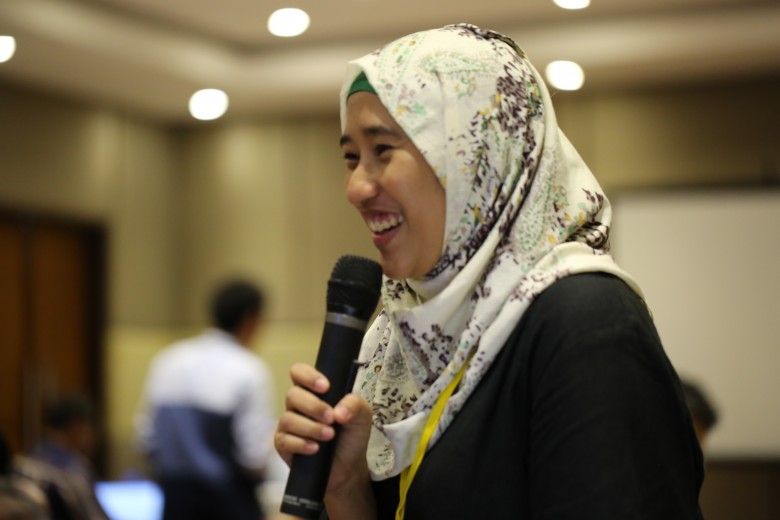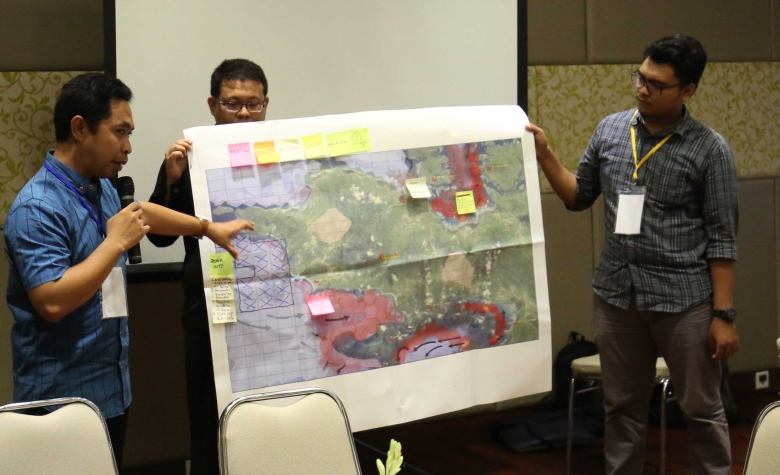
WWF Indonesia workshop cohost Ibu Estra Divari (photo: P Mumby)
MPA design in Indonesia
October 03 2016
In September, CCRES hosted a hands-on workshop for practitioners, NGOs and government agencies to support improved Marine Protected Area (MPA) design for fisheries, held in Denpasar, Bali.
Thirty-five participants from the Ministry of Marine Affairs and Fisheries, some of the newly designated marine spatial planning learning centres across regional universities and regional representatives from WWF, the Coral Trial Initiative, The Nature Conservancy, Wildlife Conservation Society, Conservation International and Reef Check had the opportunity to learn about the roles of basic and advanced MPA design.
Discussions focused on the benefits of effective MPAs, reef vulnerability, coral reef connectivity, as well as the overall coverage, size and placement of strict no-take, fishery reserves. Participants also had the opportunity to use newly available tools in order to design MPAs using their own computers.
“There has been a shift in the impetus for setting MPAs,” said Prof Peter Mumby, CCRES Chief Scientist who led the workshop together with Dr Nils Krueck (CCRES MPA Design Specialist).
“In the past, MPAs were created to protect biodiversity. Now the focus is shifting towards designating areas based on building fisheries.
“Historically the way MPA design typically was undertaken avoided putting reserves in places where fishing occurred. Now it is a different approach to actively benefitting fisheries by identifying upstream areas of fishing grounds to replenish fish populations. As the criteria for fisheries are different to biodiversity, this workshop was a great opportunity to share the most recent research into MPA design for fisheries.”
“It was fantastic to see local NGOs taking our new connectivity optimisation tool and already applying it to advice on MPA design questions in the Sunda Banda,” remarked Nils.
The workshop was a collaboration between the CCRES project and WWF Indonesia based on a related project funded by the Australian government (ARC Linkage). With our collaborators at WWF Indonesia, Estradivari and Christian Handayani, this engaging and interactive training workshop enabled us not only to share the new scientific findings, ideas and tools around MPA designs but also provided an opportunity for the participants from diverse areas around Indonesia to share their experiences and knowledge of the systems and practicalities of MPA design.
“It has been an inspiration for us at CCRES for these practitioners to share the challenges they face, and for us to consider ideas for research to address those problems,” Pete added.
“It was especially enlightening to hear a diversity of perspectives and opinions.”

Marine Spatial planning for MPAs - workshop participants (photo: P Mumby)
“It was fantastic to see local NGOs taking our new connectivity optimisation tool and already applying it to advice on MPA design questions in the Sunda Banda,” remarked Nils.
The workshop was a collaboration between the CCRES project and WWF Indonesia based on a related project funded by the Australian government (ARC Linkage). With our collaborators at WWF Indonesia, Estradivari and Christian Handayani, this engaging and interactive training workshop enabled us not only to share the new scientific findings, ideas and tools around MPA designs but also provided an opportunity for the participants from diverse areas around Indonesia to share their experiences and knowledge of the systems and practicalities of MPA design.
“It has been an inspiration for us at CCRES for these practitioners to share the challenges they face, and for us to consider ideas for research to address those problems,” Pete added.
“It was especially enlightening to hear a diversity of perspectives and opinions.”




